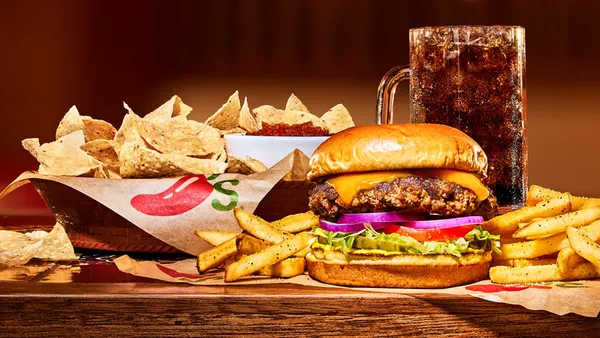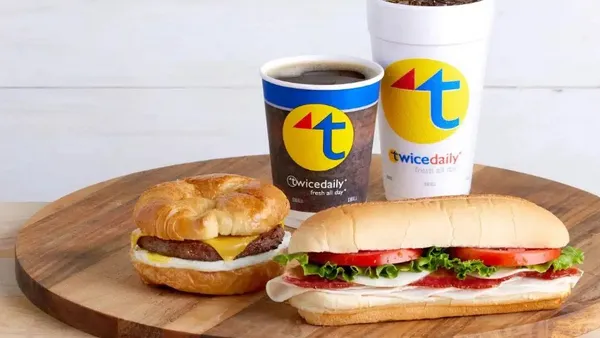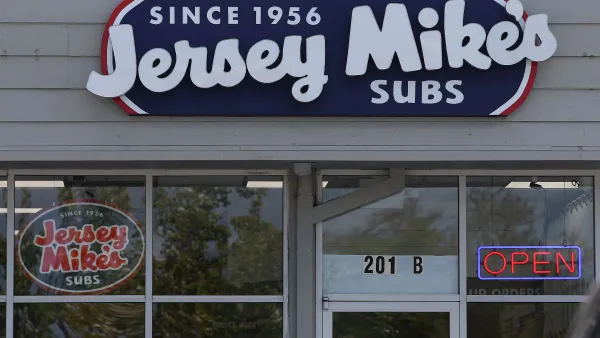UPDATE: May 16, 2019: Burger King parent Restaurant Brands International has settled its lawsuit against Fritz Management LLC, a Texas franchisee it accused of trademark infringement following a viral video of rodents inside one of the operator's restaurants.
Dive Brief:
- Burger King is suing Fritz Management and Guillermo Perales, CEO of multi-brand franchisee Sun Holdings, requesting termination of Fritz Management's agreement to operate 37 locations in Southern Texas, according to Restaurant Business. Sun Holdings, which is one of Burger King's largest operators, owns and operates over 800 restaurants.
- The impetus behind the lawsuit is a viral video showing rats inside one of the franchisee's Harlingen, Texas, restaurants. The location was shut down in February after an employee shared photos and videos of dead rats and mice in the kitchen.
- Burger King has asked the operator to stop using the brand's name in those 37 locations and accuses Fritz Management of "exhibiting reckless disregard for the physical and mental well-being" of employees, customers, the system and the public, according to Restaurant Business.
Dive Insight:
Though social media is hardly new, brands are still very much navigating the reputational impact once an unfavorable post goes viral. Starbucks, for example, experienced its lowest brand perception in 10 years after two black men waiting for a business associate were arrested at a Philadelphia location and the incident was shared on Twitter.
In Harlingen, images of the dead rats and mice in a Burger King restaurant went viral on social media — with 10,000 views on one YouTube channel — and was also picked up by news outlets internationally, including Telemundo. In the Starbucks case, the company was able to put forth a solution by implementing sensitivity training systemwide.
For Burger King, the company claims the location was in default of its franchise agreement for not fixing its problems and sales in the market have declined since the video was released, according to Restaurant Business. The company is also fueling its lawsuit by claiming the Harlingen incidents were not isolated, with Fritz closing six total restaurants before inspections were conducted. Clearly there is a pattern here that has given corporate the confidence to revoke the franchise agreement.
It is not uncommon for parent companies to sue franchisees for failure to pay royalties, rent and other expenses that are part of their agreement, and Burger King itself has gone through such a lawsuit. But claiming that a franchisee exhibited "reckless disregard" is a bit harder to prove. Burger King had to navigate a similar incident in Delaware in 2018, in which another video showed rodents in a restaurant kitchen, for example, but that franchisee, unlike the Texas franchisee, reopened after passing a follow up health inspection.
Burger King's move was a bit against the grain in today's environment, in which franchisees are becoming more empowered to challenge corporate decisions, as reflected by McDonald's new National Owners Association and Jack in the Box's no-confidence vote. But compromising health inspections on a repeated basis should be fair game for corporate to regain control, not just for the brand's reputational management, but also for the health and safety of its employees and guests.
Guillermo Perales, the principal in Fritz Management, told Nation's Restaurant News he took immediate action to eradicate the rodent problem after it arose and offered diners free Whoppers in the weeks that followed.
“My client is very happy that this type of tension, which sometimes happens in franchising today due to economic challenges and increased competition in the marketplace, can be amicably resolved quickly and fairly before the courts have to strongly intervene,” Perales' lawyer Robert Zarco told NRN.











